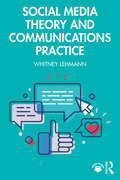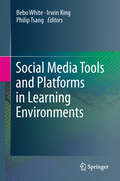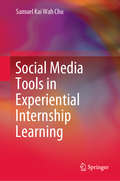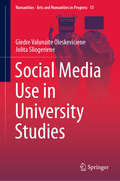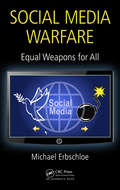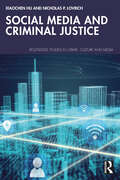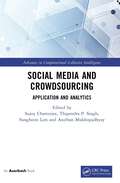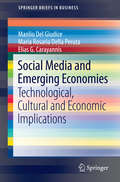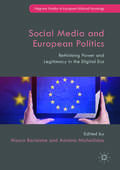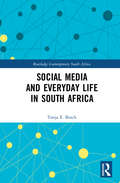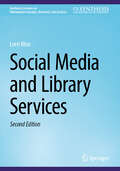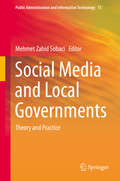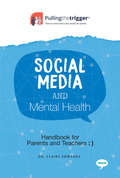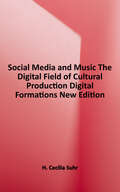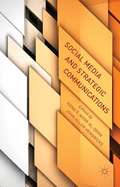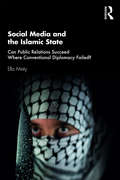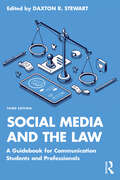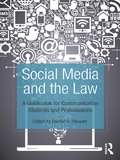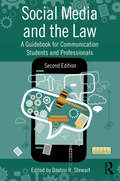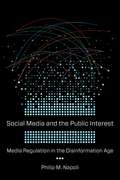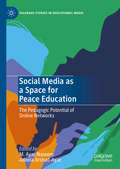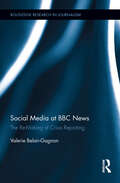- Table View
- List View
Social Media Theory and Communications Practice
by Whitney LehmannFusing the academic with the applied, this book provides a comprehensive introduction to social media for future communications professionals.While most social media texts approach the subject through either a theoretical, scholarly lens or a professional, practical lens, this text offers a much-needed linkage of theory to the practical tactics employed by social media communicators. Concise and conversational chapters break down the basics of both social media theory and practice and are complemented by sidebars written by scholars and industry professionals, chapter summaries and end-of-chapter exercises.This book is ideal for introductory social media courses in communication, public relations and mass communication departments, as well as courses in digital media and public relations.Online resources include social media writing templates, sample posts and content calendar templates. Please visit www.routledge.com/9781032185873.
Social Media Tools and Platforms in Learning Environments
by Irwin King Bebo White Philip TsangOnline social media have transformed the face of human interaction in the 21st century. Wikis, blogs, online groups and forums, podcasts, virtual worlds, and social tagging are but a few of the applications enabling innovative behaviors that support acquisition, access, manipulation, retrieval, and visualization of information. It is, therefore, no surprise that educational practitioners and theorists have begun to explore how social media can be harnessed to describe and implement new paradigms for communication, learning, and education. The editors' goal in publishing this book was to identify original research on the application of online social media and related technologies in education as well as emerging applications in Web technologies that could provide and shape future educational platforms. The selected contributions deal with questions such as how social media can truly enrich and enhance learning and teaching experiences in ways not otherwise possible; how learning can be integrated in a distributed and ubiquitous social computing environment; or what theories, paradigms, and models are applicable for the support of social computing in education. Researchers in education or educational software will find interesting and sometimes provocative chapters on paradigms and methodologies, virtual and mobile learning spaces, and assessment and social factors. Practitioners in these fields will benefit from an additional section devoted to case studies and first experience reports.
Social Media Tools in Experiential Internship Learning
by Samuel Kai ChuThis book describes how a support structure can be built to enhance peer-to-peer (and also students-to-lecturers) communication and support. It informs lecturers on how they can decide if they should adopt one or more social media tools to facilitate students’ learning, communication, and support for an internship program. This book introduces a participatory design approach that can help develop a pedagogy that will make good use of social media tools on internship learning. It presents a framework for experiential internship learning, integrating helpful educational practices such as participatory design approach and the use of social media.
Social Media Use in University Studies (Numanities - Arts and Humanities in Progress #13)
by Jolita Sliogeriene Giedre Valunaite OleskevicieneThis book highlights the phenomenon of social media use in university studies based on its participants’ lived experience. It will appeal both to academics and practitioners interested in the human factors in the study environments saturated with technologies of social media. This book reveals multiple, sometimes contradictory dimensions of the phenomenon. The contradictions acquire a binary Janus-faced characteristic of uncertainty and paradox. Social media use in university studies also causes changes in experiencing time, space and relations. Teacher research participants sometimes perceive their time as stress or an additional load, which shows that social media use in university studies demands a new approach to teacher workload and its regulation. There is also the necessity of the sensitive democratic teacher—student pedagogical relationship. This book proves that the pedagogical relationship and human creativity essentially belong to the human living world and are still at the heart of the technological “cyborgian” existence.
Social Media Warfare: Equal Weapons for All
by Michael ErbschloeSocial media applications can be weaponized with very little skill. Social media warfare has become a burden that nation states, government agencies, and corporations need to face. To address the social media warfare threat in a reasonable manner that reduces uncertainty requires dedication and attention over a very long-term. To stay secure, they need to develop the capability to defend against social media warfare attacks. Addressing unconventional warfare strategies and tactics takes time and experience, plus planning and dedication. This book will help managers develop a sound understanding of how social media warfare can impact their nation or their organization.
Social Media and Criminal Justice (Routledge Studies in Crime, Culture and Media)
by Nicholas P. Lovrich Xiaochen HuDiscussing social media-related scholarship found in criminology, legal studies, policing, courts, corrections, victimization, and crime prevention, this book presents the current state of our knowledge on the impact of social media and the major sociological frameworks employed to study the U.S. justice system.Building a theoretical framework for the study of social media and criminal justice in each chapter, the chapters provide a systematic reflection of extant research on social media in cybercrime, operations of courts, administration of institutional and community corrections, law enforcement, and crime prevention. The book fills the gap between the contemporary state of knowledge regarding social media and criminal justice with respect to both empirical evidence and types of sociological frameworks being employed to explore and identify the societal costs and benefits of our growing dependence upon social media. In addition to providing an up-to-date overview of our current state of knowledge, this book highlights important areas of future research, wherein the benefits of social media can be expanded and the negative aspects of its broadening use can be minimized.Social Media and Criminal Justice will be of interest to students, scholars and practitioners in the areas of judicial administration, corrections management, law enforcement, and criminal justice-engaged community-based nonprofit organizations involved in court-referred treatment and/or active collaboration with local law enforcement agencies.
Social Media and Crowdsourcing: Application and Analytics (Advances in Computational Collective Intelligence)
by Anirban Mukhopadhyay Thipendra P. Singh Sujoy Chatterjee Sunghoon LimSocial media and crowdsourcing are important tools for solving complex problems. The benefit of crowdsourcing is that it leverages the power of human intelligence cost effectively and with less time. Social Media and Crowdsourcing: Application and Analytics examines the concepts of social media and crowdsourcing as well as their analytical aspects. It explores how these technologies contribute to the real world and examines such applications as promoting social good, agriculture, healthcare, tourism, disaster management, education, crime control, and cultural heritage. The book also looks at ethical issues in crowdsourcing and future scenarios and challenges for policy. Highlights of the book include the following: A crowdsourcing application in agriculture Crowdsourcing outline for a contemporary aided medicinal backup system Crowdsourcing-based recommendation in the tourism industry Crowdsourcing mechanisms for reviving cultural heritage Expanding the overarching concept of utilizing social media and crowdsourcing to solve various real-life problems, this book discusses how to bring together the wisdom of crowds for various decision-making problems in agriculture, disaster management, and healthcare. It addresses the various ethical issues arising out of various crowdsourcing-based applications. It puts forward diverse methodologies to involve crowdsourcing in education to implement new strategies to enhance learning outcomes. This book also addresses various problem-solving techniques for recommender applications in the travel and tourism industry. Providing a systematic discussion of the many sectors using crowdsourcing as an essential part of social innovation, this book is a theoretical and methodological look at the application of social media.
Social Media and Electronic Commerce Law
by Alan DavidsonThe ever-evolving nature of electronic commerce and social media continues to challenge the capacity of the courts to respond to privacy and security violations in 'cyberlaw'. Social Media and Electronic Commerce Law is designed to provide students and legal practitioners with a thorough and engaging exploration of the laws, regulations and grey areas of commerce via online platforms. This new edition has been thoroughly revised to address changes in legislation and recent court judgments, and to reflect the dynamic sphere of social media. New chapters focus on internet and e-commerce law regarding social media, P2P file sharing, Cloud computing and workplace issues, with an emphasis on data security made particularly relevant by the proliferation of hacking incidents. Written in an accessible style, Social Media and Electronic Commerce Law investigates the challenges facing legal practitioners and commercial parties in this dynamic field, as well as the underlying legal theory that governs it.
Social Media and Emerging Economies
by Maria Rosaria Della Peruta Manlio Del Giudice Elias G. CarayannisHow have social media in emerging economies evolved differently from the rest of the world? According to studies and anecdotal evidence, innovations in the use of social media tools occur more frequently in emerging economies than they do in developed markets. The aim of this volume is to show that in emerging regions (such as China, India, and South America) where the participation of stakeholders in the circuit of social media is more active (i. e. , greater frequency of contacts and creativity in the elaboration of contents), organizations not only are involved in a set of exchange relations with other social actors but are also embedded in a network of dynamic relationships. The authors utilize social network analysis to determine how entrepreneurs in emerging economies identify their most beneficial social contacts and use those contacts to leverage the resources needed for their enterprises, revealing new insights on the process of business creation and economic development in the networked age.
Social Media and European Politics
by Mauro Barisione Asimina MichailidouThis volume investigates the role of social media in European politics in changing the focus, frames and actors of public discourse around the EU decision-making process. Throughout the collection, the contributors test the hypothesis that the internet and social media are promoting a structural transformation of European public spheres which goes well beyond previously known processes of mediatisation of EU politics. This transformation addresses more fundamental challenges in terms of changing power relations, through processes of active citizen empowerment and exertion of digitally networked counter-power by civil society, news media, and political actors, as well as rising contestation of representative legitimacy of the EU institutions. Social Media and European Politics offers a comprehensive approach to the analysis of political agency and social media in European Union politics, by bringing together scholarly works from the fields of public sphere theory, digital media, political networks, journalism studies, euroscepticism, political activism and social movements, political parties and election campaigning, public opinion and audience studies.
Social Media and Everyday Life in South Africa (Routledge Contemporary South Africa)
by Tanja E BoschThis book explores how social media is used in South Africa, through a range of case studies exploring various social networking sites and applications. This volume explores how, over the past decade, social media platforms have deeply penetrated the fabric of everyday life. The author considers South Africans’ use of wearable tech and use of online health and sports tracking systems via mobile phones within the broader context of the digital data economy. The author also focuses on the dating app Tinder, to show how people negotiate and redefine intimacy through the practice of online dating via strategic performances in pursuit of love, sex and intimacy. The book concludes with the use of Facebook and Twitter for social activism (e.g. Fees Must Fall), as well as networked community building as in the case of the #ImStaying movement. This book will be of interest to social media academics and students, as well as anyone interested in social media, politics and cultural life in South Africa.
Social Media and Library Services (Synthesis Lectures on Information Concepts, Retrieval, and Services)
by Lorri MonThis Second Edition presents research, theory, and practical applications for social media and libraries, providing insights into the life of the social library. Readers are introduced to the features of social sites that can be leveraged to create a unique and diversified library social media presence. The author explains how social media sites and services can be assessed based on a variety of attributes, such as visibility, voice, interaction, reach, impact, and reputation. This new edition addresses the changes in the social media landscape since the first edition was published as well as new issues that impact how libraries use social media. The author also addresses new issues that are impacting how libraries use social media, including changing algorithms, artificial intelligence, misinformation, privacy, moderation, policy issues, and more.
Social Media and Local Governments
by Mehmet Zahid SobaciToday, social media have attracted the attention of political actors and administrative institutions to inform citizens as a prerequisite of open and transparent administration, deliver public services, contact stakeholders, revitalize democracy, encourage the cross-agency cooperation, and contribute to knowledge management. In this context, the social media tools can contribute to the emergence of citizen-oriented, open, transparent and participatory public administration. Taking advantage of the opportunities offered by social media is not limited to central government. Local governments deploy internet-based innovative technologies that complement traditional methods in implementing different functions. This book focuses on the relationship between the local governments and social media, deals with the change that social media have caused in the organization, understanding of service provision, performance of local governments and in the relationships between local governments and their partners, and aims to advance our theoretical and empirical understanding of the growing use of social media by local governments. This book will be of interest to researchers and students in e-government, public administration, political science, communication, information science, and social media. Government officials and public managers will also find practical use recommendations for social media in several aspects of local governance
Social Media and Mental Health: Handbook for Parents and Teachers (Pulling the Trigger)
by Claire EdwardsSocial Media and Mental Health: Handbook for Parents and Teachers will help you navigate the tricky waters surrounding your child’s use of the internet. Written by Clare Edwards, a clinical psychologist experienced in the field of adolescent mental health, it will highlight the challenges of parenting in the digital age, and offer tips and advice on how to keep your children safe online. Most importantly, this quick and easy illustrated guide explores the impact of social media on children's mental health, providing tools for ensuring that your child has a healthy relationship with social media and the internet.
Social Media and Music: The Digital Field of Cultural Production
by H. Cecilia SuhrThis book explores social networking sites as the digital field of cultural production by loosely drawing from Pierre Bourdieu’s notion of field and capital. The book examines four case studies on MySpace, YouTube, Second Life, and Indaba Music, and the roles and the impact they have on the music industry and musicians. In doing so, the author explores the groundbreaking developments that empower independent musicians and problematizes the emergence of a variety of issues symptomatic of social media environments at the height of convergence culture.
Social Media and Strategic Communications
by John Allen Hendricks Hana S. Noor Al-DeenSocial Media and Strategic Communications provides truly comprehensive and original scholarly research that exhibits the strategic implementation of social media in both advertising and public relations.
Social Media and the Internet
by Meg GreveFilled with popular childhood themes and experiences, Social Media and the Internet features kid friendly, real world examples. Practical tips spark lively, meaningful conversations about social media and the internet.
Social Media and the Islamic State: Can Public Relations Succeed Where Conventional Diplomacy Failed?
by Ella MintyThis book examines how social media has transformed extremist discourse. Drawing on ISIS and their sophisticated use of social media platforms and PR concepts, it explores the ways in which the outfit was able to recruit, mobilise and spread fundamentalist propaganda in regions where it had little physical presence. One of the first studies to draw a link between international diplomacy, the rise of fundamentalism and public relations, this book will be of great interest to scholars and researchers of defence and strategic studies, especially those working on ISIS propaganda, Middle East Studies, media studies, digital humanities, communication studies, public relations and international relations, as well general readers.
Social Media and the Law: A Guidebook for Communication Students and Professionals
by Daxton R. StewartThis fully updated third edition of Social Media and the Law offers an essential guide to navigating the complex legal terrain of social media. Social media platforms like Facebook, Twitter, Instagram, YouTube, and TikTok have become vital tools for professionals in the news and strategic communication fields. As these services have rapidly grown in popularity, their legal ramifications have continued to develop, resulting in students and professional communicators needing to be aware of laws relating to defamation, privacy, intellectual property, and government regulation. Editor Daxton Stewart brings together eleven media law scholars to address key questions, such as the following: To what extent do communicators put themselves at risk for lawsuits when they use these tools? What rights do communicators have when other users talk about them on social networks? How can people and companies manage intellectual property issues consistent with the developing law in this area? This book is essential for students of media, mass communication, strategic communication, journalism, advertising, and public relations, as well as professional communicators that use social media in their role.
Social Media and the Law: A Guidebook for Communication Students and Professionals
by Daxton R. “Chip” StewartSocial media platforms like Facebook, Twitter, Pinterest, YouTube, and Flickr allow users to connect with one another and share information with the click of a mouse or a tap on a touchscreen—and have become vital tools for professionals in the news and strategic communication fields. But as rapidly as these services have grown in popularity, their legal ramifications aren’t widely understood. To what extent do communicators put themselves at risk for defamation and privacy lawsuits when they use these tools, and what rights do communicators have when other users talk about them on social networks? How can an entity maintain control of intellectual property issues—such as posting copyrighted videos and photographs—consistent with the developing law in this area? How and when can journalists and publicists use these tools to do their jobs without endangering their employers or clients? In Social Media and the Law, eleven media law scholars address these questions and more, including current issues like copyright, online impersonation, anonymity, cyberbullying, sexting, and WikiLeaks. Students and professional communicators alike need to be aware of laws relating to defamation, privacy, intellectual property, and government regulation—and this guidebook is here to help them navigate the tricky legal terrain of social media.
Social Media and the Law: A Guidebook for Communication Students and Professionals
by Daxton StewartSocial media platforms like Facebook, Twitter, Instagram, YouTube, and Snapchat allow users to connect with one another and share information with the click of a mouse or a tap on a touchscreen—and have become vital tools for professionals in the news and strategic communication fields. But as rapidly as these services have grown in popularity, their legal ramifications aren’t widely understood. To what extent do communicators put themselves at risk for defamation and privacy lawsuits when they use these tools, and what rights do communicators have when other users talk about them on social networks? How can an entity maintain control of intellectual property issues—such as posting copyrighted videos and photographs—consistent with the developing law in this area? How and when can journalists and publicists use these tools to do their jobs without endangering their employers or clients? Including two new chapters that examine First Amendment issues and ownership of social media accounts and content,?Social Media and the Law brings together thirteen media law scholars to address these questions and more, including current issues like copyright, online impersonation, anonymity, cyberbullying, sexting, and live streaming. Students and professional communicators alike need to be aware of laws relating to defamation, privacy, intellectual property, and government regulation—and this guidebook is here to help them navigate the tricky legal terrain of social media.
Social Media and the Public Interest: Media Regulation in the Disinformation Age
by Philip M. NapoliFacebook, a platform created by undergraduates in a Harvard dorm room, has transformed the ways millions of people consume news, understand the world, and participate in the political process. Despite taking on many of journalism’s traditional roles, Facebook and other platforms, such as Twitter and Google, have presented themselves as tech companies—and therefore not subject to the same regulations and ethical codes as conventional media organizations. Challenging such superficial distinctions, Philip M. Napoli offers a timely and persuasive case for understanding and governing social media as news media, with a fundamental obligation to serve the public interest.Social Media and the Public Interest explores how and why social media platforms became so central to news consumption and distribution as they met many of the challenges of finding information—and audiences—online. Napoli illustrates the implications of a system in which coders and engineers drive out journalists and editors as the gatekeepers who determine media content. He argues that a social media–driven news ecosystem represents a case of market failure in what he calls the algorithmic marketplace of ideas. To respond, we need to rethink fundamental elements of media governance based on a revitalized concept of the public interest. A compelling examination of the intersection of social media and journalism, Social Media and the Public Interest offers valuable insights for the democratic governance of today’s most influential shapers of news.
Social Media as a Space for Peace Education: The Pedagogic Potential of Online Networks (Palgrave Studies in Educational Media)
by M. Ayaz Naseem Adeela Arshad-AyazThis book explores the potential of social media as a space for teaching and bringing about sustainable peace. Using cutting-edge research, the editors and authors analyze the fundamental transformations taking place in the digital and interactive public sphere, most recently with the advent of the ‘post-truth’ age and the impact of this upon young people’s perceptions of ‘friend’ and ‘foe’. Peace initiatives at almost every level recognize the importance of education for sustainable peace: this volume examines the opportunities emerging from these societal transformations for both formal and informal education. This book will appeal to students and scholars of social media, peace education and the post-truth age.
Social Media at BBC News: The Re-Making of Crisis Reporting (Routledge Research in Journalism)
by Valerie Belair-GagnonSince the emergence of social media in the journalistic landscape, the BBC has sought to produce reporting more connected to its audience while retaining its authority as a public broadcaster in crisis reporting. Using empirical analysis of crisis news production at the BBC, this book shows that the emergence of social media at the BBC and the need to manage this kind of material led to a new media logic in which tech-savvy journalists take on a new centrality in the newsroom. In this changed context, the politico-economic and socio-cultural logic have led to a more connected newsroom involving this new breed of journalists and BBC audience. This examination of news production events shows that in the midst of transformations in journalistic practices and norms, including newsgathering, sourcing, distribution and impartiality, the BBC has reasserted its authority as a public broadcaster. Click here for a short video about the book.
